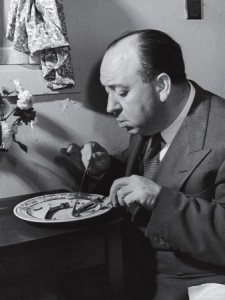“I do hope the great haste with which we’re assembling this slapdash repast is not going to affect me internally and render me incapable of appreciating good music.” — Claude Rains to his dinner guests in Deception
It is the rare movie that doesn’t have at least one eating scene, whether in a diner, at a campsite, on a balcony, on a lawn or at a candelabra-lit dining table, whether a candy bar, a sandwich, a seven-course banquet or, maybe even, a repulsive horror meal. My Dinner with Andre, an almost two-hour film, is nothing more than a conversation between two old theater friends at a restaurant, while in The Man Who Came to Dinner, the only dinner is brief and incidental to the plot, though giving Monty Woolley the opportunity to ask some Chinese students, “Is it true, in China, you drown middle-age business men at birth?”
The greater portion of Dinner at Eight is devoted to the guests’ preparation for the dinner and a study of their characters, their foibles and intrigues, and for Marie Dressler to utter a great movie line. After Jean Harlow has admitted reading a “nutty kind of a book” about machinery eventually replacing every profession, Dressler, glancing at the sexily dressed Harlow, remarks, “Oh, my dear, that’s something you need never worry about.” In Guess Who’s Coming to Dinner, although there is much preparation and anticipation—and humor, especially Spencer Tracy’s visit to a drive-in and a request for an elusive favorite ice cream—the meal is really an excuse for Tracy and Sidney Portier to make their Oscar-worthy speeches, although only Tracy was nominated, not Portier, neither here nor for In the Heat of the Night that same year.
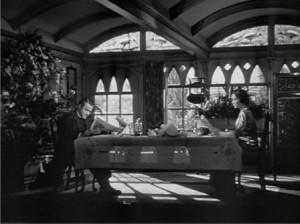 One of the greatest of all movie dining scenes occurs in Citizen Kane. In the famous breakfast montage, it’s not so much what husband and wife say over the years, although it’s apparent they are growing further apart, but what is seen on screen and heard in Bernard Herrmann’s music. Visually, Orson Welles and Ruth Warwick are at first intimately close, talking about themselves; as the years pass in the time-lapse, the table becomes longer and they move physically further apart. Emotionally, too, they become less engaged with one another and even their politics change, and the music underlines, more and more, their increasing alienation.
One of the greatest of all movie dining scenes occurs in Citizen Kane. In the famous breakfast montage, it’s not so much what husband and wife say over the years, although it’s apparent they are growing further apart, but what is seen on screen and heard in Bernard Herrmann’s music. Visually, Orson Welles and Ruth Warwick are at first intimately close, talking about themselves; as the years pass in the time-lapse, the table becomes longer and they move physically further apart. Emotionally, too, they become less engaged with one another and even their politics change, and the music underlines, more and more, their increasing alienation.
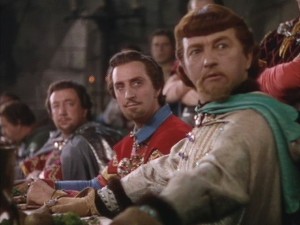 Not a problem in this moment from Citizen Kane, but filming scenes at a dining table, and keeping things straight, can cause headaches for directors and cinematographers, especially when there are many guests and long tables: the castle banquet in The Adventures of Robin Hood, the country gentry in Gosford Park, the prison mess hall in The Shawshank Redemption, the ten potential victims at their first dinner in And Then There Were None when there are still ten. There must be, of course, a master, establishing shot, a full view of where everyone is sitting in relation to everyone else, so when Actress A speaks to Actor B, and he’s across the table to her left, a close-up will show her looking to her left.
Not a problem in this moment from Citizen Kane, but filming scenes at a dining table, and keeping things straight, can cause headaches for directors and cinematographers, especially when there are many guests and long tables: the castle banquet in The Adventures of Robin Hood, the country gentry in Gosford Park, the prison mess hall in The Shawshank Redemption, the ten potential victims at their first dinner in And Then There Were None when there are still ten. There must be, of course, a master, establishing shot, a full view of where everyone is sitting in relation to everyone else, so when Actress A speaks to Actor B, and he’s across the table to her left, a close-up will show her looking to her left.
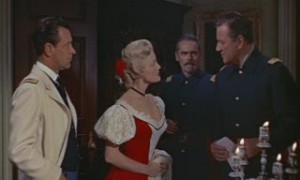 Movie meals are frequently comic. In the rather long dinner in John Ford’s The Horse Soldiers, Southern belle Constance Towers hosts some invading Yankee officers. While she is forever jumping up, the officers repeatedly stand en messe, followed by her mild reproach, “Please be seated, gentlemen.” When the officers reveal their occupations, including actor and politician, before the Civil War, Towers misconstrues John Wayne’s as a railroad engineer, and exclaims how exciting it must be running that big engine, “a-huffin’ and a-puffin’, and a-ringin’ that little bell. Ding dong, ding dong.” Wayne corrects her adamantly, that his job was in the construction of railroads. And when she extends a platter of chicken in her low-neck dress, asking him if he prefers the breast or the leg, he replies, “I’ve had plenty of both, thank you.”
Movie meals are frequently comic. In the rather long dinner in John Ford’s The Horse Soldiers, Southern belle Constance Towers hosts some invading Yankee officers. While she is forever jumping up, the officers repeatedly stand en messe, followed by her mild reproach, “Please be seated, gentlemen.” When the officers reveal their occupations, including actor and politician, before the Civil War, Towers misconstrues John Wayne’s as a railroad engineer, and exclaims how exciting it must be running that big engine, “a-huffin’ and a-puffin’, and a-ringin’ that little bell. Ding dong, ding dong.” Wayne corrects her adamantly, that his job was in the construction of railroads. And when she extends a platter of chicken in her low-neck dress, asking him if he prefers the breast or the leg, he replies, “I’ve had plenty of both, thank you.”
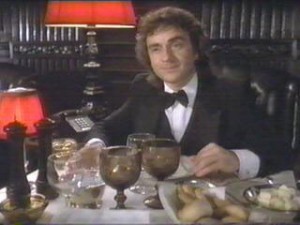 In the original Arthur, the early dining scene at a plush restaurant with a prostitute gives full time drunk and playboy Dudley Moore numerous opportunities for pointed one-liners. “You’re the only woman . . . at this table,” he says and laughs. Oh, he’s always laughing, as life seems a joke to him—more precisely, his own life is a joke. He goes on and on about how small a certain country is: “It’s terribly small, tiny little country. Rhode Island could beat the crap out of it in a war. That’s how small it is.”
In the original Arthur, the early dining scene at a plush restaurant with a prostitute gives full time drunk and playboy Dudley Moore numerous opportunities for pointed one-liners. “You’re the only woman . . . at this table,” he says and laughs. Oh, he’s always laughing, as life seems a joke to him—more precisely, his own life is a joke. He goes on and on about how small a certain country is: “It’s terribly small, tiny little country. Rhode Island could beat the crap out of it in a war. That’s how small it is.”
